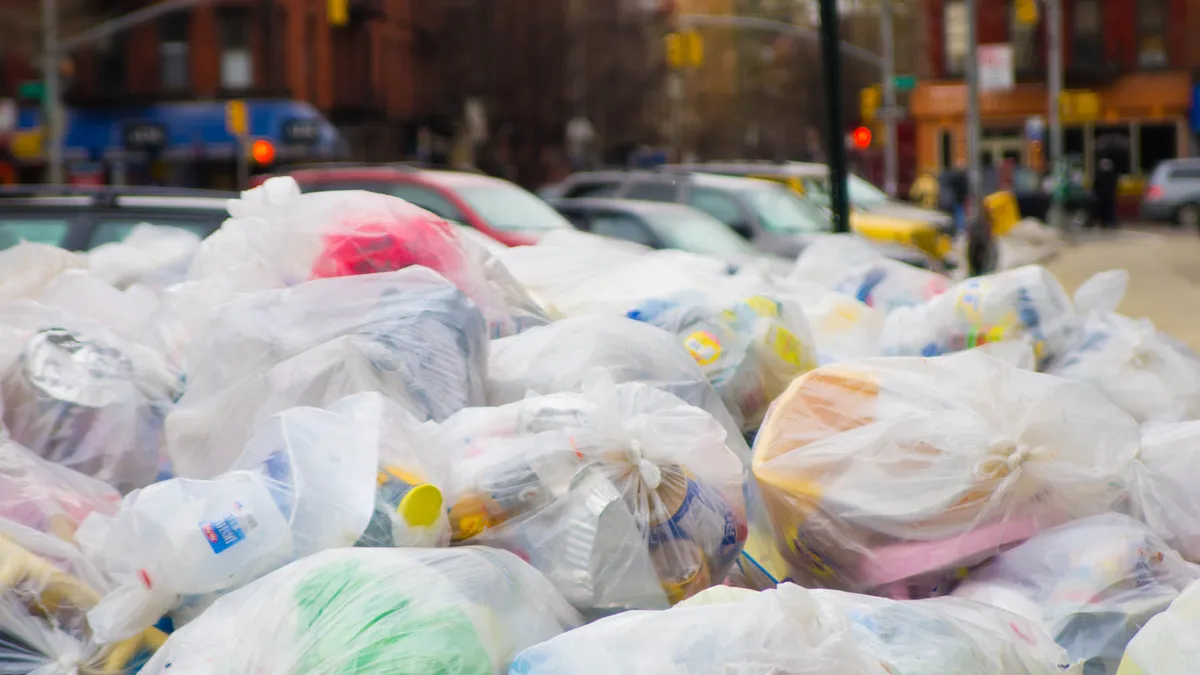UPDATE: July 3, 2019: Twenty-seven organizations — including Closed Loop Partners, the Institute of Scrap Recycling Industries (ISRI) and the Northeast Recycling Council — have signed onto the industry-led Recycle More Bags coalition since its April 2019 launch.
"By creating incentives for minimum recycled content, we can both increase plastic recycling rates and help ensure plastic bags are managed in an environmentally responsible manner," said Robin Wiener, president of ISRI, in a statement.
Dive Brief:
- More than a dozen recycling businesses and advocacy groups have signed a letter urging the Canadian federal and provincial governments to adopt recycled content mandates or procurement policies for plastic bags. EFS-plastics spearheaded the effort, with signatories including Sims Municipal Recycling, GDB International, FirstStar Recycling, More Recycling, Reterra and Revolution Plastics.
- The signatories want government legislation requiring the minimum recycled content in garbage bags to reach 10% by 2020, 15% by 2022 and 20% by 2024. They are advocating for minimum recycled content in plastic carryout bags to reach 10% by 2021, 15% by 2023 and 20% by 2025. The recommendations specifically encourage the use of "post-consumer" recycled plastic content.
- The letter notes that "[w]hile high-value commodities like cardboard or water bottles can still be sold domestically, lower-value commodities like plastic bags are at the greatest risk of being landfilled or incinerated." Preliminary analysis from More Recycling indicates 300,000 tons of plastic bags collected for recycling in North America last year may have been disposed due to lack of markets.
Dive Insight:
The signatories drafted the letter in light of a collapse in plastic export markets — specifically, market changes prompted by China's material import regulations — and rising public concern about plastic waste in the environment. Creating more demand for material such as plastic bags, agricultural film, boat wrap and post-commercial pallet wrap could potentially address both challenges.
With oil production expected to increase in the near future and make virgin plastic even more affordable, the letter's signatories see cause for concern that new North American demand won't come online quickly enough to make up for declining export options. They note that bags are made of a highly-recyclable resin that can be processed many times without losing its integrity. As with other commodities, identifying domestic plastic resin end markets has taken a higher priority following China's material import bans and tightened contamination standard.
The letter states that recycled content mandates are a direct market-driven approach to encourage the recycling industry's growth. While some prefer voluntary corporate recycled content commitments to government mandates, the signatories believe this is unlikely to drive real change. The letter suggests that plastic bag recycled content mandates would lessen reliance on material export markets, reduce plastic litter, reduce carbon emissions by replacing the use of virgin plastic and boost circular economic development.
The signatories cite several examples of North American government recycling mandates as guidelines for successful legislation. California has a requirement that plastic garbage bags contain 10% recycled content, and the Washington State Senate in March passed a plastic bag ban bill that would require paper bags and reusable plastic bags to contain at least 40% recycled material.
Although some recycling and environmental advocates have urged plastic bag bans as a more viable solution, the signatories' letter instead requests better plastic bag recyclability and content standards. The blending of those two aspects — considered by some industry participants to be a best practice for achieving a circular economy — makes the proposed recyclable content mandates not just an environmental strategy, but an economic one as well.
















